X
wikiHow is a “wiki,” similar to Wikipedia, which means that many of our articles are co-written by multiple authors. To create this article, volunteer authors worked to edit and improve it over time.
This article has been viewed 7,798 times.
Learn more...
The transition from elementary to middle school can be terrifying, but in reality, it's not that difficult. Sure, the whole school's layout is different, you have to deal with puberty, and more peer pressure, but there are easy ways to deal with those situations. Middle school is not that hard, and since it's only 3 years, you'll be going to high school in a snap! If you are in 6th or 7th grade this year, this article is for you.
Steps
Part 1
Part 1 of 3:
Before Middle School Starts
-
1Cope with mixed feelings. Middle school is the next level up to your future! Think of life like a video game- each level gets progressively harder and harder, and you may have to repeat steps to get to the next level. Middle school often means new friends, getting used to a block schedule, getting a locker, and dealing with other challenges. Your friends may be in a different school than you, so you'll have to make many new friends. Talking with people you don't know can be intimidating, but assume good faith. Not everyone's a bully or isn't interested in you- just imagine that the person's a nice person that wants to make as many friends as possible.
- You may be excited about going to a new school- new teachers, making new friends, getting a locker, and ditching old, mean friends can be a relief to many kids who found out that being in middle school means that a bunch of people are new to you. Some people will know you from elementary school (if they go to the same school as you), but others will be from different elementary schools.
- If you are nervous, that's normal! Middle schools are often larger than elementary schools, and teachers expect students to be responsible for all of their tasks- students need to do their homework, turn it in on time, manage chores, juggle with extracurriculars (which may increase in middle school), and do other things.
- If you are sad, cry it out. It's ok to be sad if you are leaving your elementary school. Especially if you have been at your elementary school since kindergarten or preschool (which totals to 6-8 years in elementary school), it's hard to leave your best friends and teachers that you've known for so long!
-
2Deal with being excited for middle school. 6th or 7th grade means a new beginning for students. All of the teachers are new, you will have a different schedule, get assigned a locker, and make a lot of fun friends. If you've just graduated elementary school, you'll have to wait until summer vacation's over.
- In the meantime, talk with your friends online! You can get some life updates from them and share your thoughts about middle school together. You could also fill up your time going on a vacation like a regular summer vacation. Travel across the state, across the country, or even to a different country.
- When you're nearing the beginning of middle school, happily shop for school supplies. If you've used your school supplies for many years already, they're probably worn out or broken. Purchase new ones at a school supply shop, like Staples, Target, Office Depot, etc. If your school offers you school supplies, just purchase some pencils, a couple of erasers, a glue stick, some pens, a pair of scissors, and a pencil case to put those supplies in.
Advertisement -
3Deal with your feelings if you are sad. Elementary school, for some kids, marks the end of friendships and childhood. In middle school, talking about My Little Pony or SpongeBob SquarePants might get you a few stares and you could be seen as immature. You may have to deal with friends moving away or going to a different school. All of this can be hard to deal with.
- If your friends are leaving, take time to talk to them during the last months, weeks, and days of school. Make sure to ask them for their contact info, like their email address or phone number. This ensures that you can email or call each other during convenient times even if you can't see each other.
- If you have more unique interests, you may be seen as immature. If you still enjoy playing with toys, that's ok! Same goes if you watch cartoons. Not everyone outgrows these things, and many outgrow them due to peer pressure that liking these things is "immature", "babyish", or "stupid". Don't listen to those mean/negative people and walk away when they start talking about this. Talk to a teacher about these bullies if they physically hurt you or call you names.
-
4Prepare for middle school. Middle school is different than elementary school in many different ways. You'll have more work to do, and you will need to be responsible for turning in your homework and managing your time responsibly. Peer pressure may increase in middle school too. This might sound like a lot to deal with, but it is actually easy to get used to. You may have required reminders from your parents to do homework. This will decrease, and your parents will likely increase their expectations that you know what homework to do and when to turn it in.
- You will need to improve on your studying skills, since tests will increase. Don't put off studying until the last day- you won't remember anything you crammed into that study session, and you will get bad grades. Start studying a week to 4 days before the test.
- Understand that you don't have to give in to requests from others. You don't (and shouldn't) listen to people that tell you to bully others, pull mean pranks, steal something, injure others, gossip, vandalize, drink underage, or do any other unethical or illegal things. Doing these could get you expelled or even arrested.
-
5Check in with your parents to see information about your middle school. A month to a few weeks before the middle school year starts, your school should've provided you with basic information about the school, what the rules are, who the teachers are, and the dress code. Your school usually sends an email to your caretakers that talks about these things. Go over these things and ask your parents to send a follow-up email if you have concerns or questions on anything.
- A month to a week before school starts, you might receive your homeroom teacher, the first class/period you have and what classroom it is in, and/or your schedule. Review these things to make sure you don't get lost on the first day!
Advertisement
Part 2
Part 2 of 3:
On the First Day of Middle School
-
1Get up earlier. This doesn't just apply to people who live further away from the school- even if you live just 5 minutes from the school, you never know what could happen. Your parents' car might've broken down, you may have a menstrual accident in your school clothes (and have to clean up), you might have lost school supplies, or your siblings might've woken up too late. Wake up an hour to 30 minutes earlier than your regular wakeup time. This ensures that you know where to go and what to prepare for middle school.
- If you usually wake up at 7 AM for school, set your alarm or wake up at 6:30 AM. If you wake up at 6:30 AM, wake up at 6 AM. If you wake up at 7:15, wake up at 6:45 AM at the least.
-
2Go over your classroom number, your homeroom teacher's name, and/or your schedule. These things are given to you a month to a week before school starts, and you want to review these things just in case you forget. Write these down in a planner or a small notepad just for school stuff. [1]
- If your schedule says you go to Room 19, find where Room 19 is on the school map or directory. If it says Room 206, search for room 206.
-
3Find a nice outfit to wear on the first day of middle school. You should wear a nice outfit to wear on the first day of middle school. It makes you feel more confident and can help you make friends easier! If your school does not provide nor require uniforms, you will need to choose your own clothing. Choose a simple outfit. It could be as easy as a T-shirt and sweatpants or a blouse and jeans.
- Before you choose an outfit, groom yourself by shaving off armpit and leg hairs and showering if you do it in the morning. You should also comb your hair to make it presentable.
- You don't want to wear overly distracting clothing, like neon or sparkly pieces. Don't wear anything with swear words or inappropriate slurs on it.
- You should also avoid overly revealing clothing at all costs. Don't wear a short crop top or a shirt with a very low neckline. Don't put on a very short skirt or sag your pants either.
- If you require a uniform, wear that. Wear your uniform (that your caretakers probably purchased from the school or a uniform company), which could consist of a white, red, blue, or gray polo shirt, trousers with a belt, a plaid or gray skirt, and a school uniform sweater, sweatshirt, or jacket if it's chilly outside.
-
4Stay calm when you arrive at your first class. When you get to school, it's probably very nerve-wracking. So, calm your fears down when it's time to enter the classroom. Promise yourself that your first class will go amazingly, and that it'll be very fun. Don't worry that people will hate you, that you'll get lost during your next class, or that the teacher will be mean. Understand that you have those thoughts, then change them to positive thoughts. You will be liked by everyone, you will find your way to your next class, and the teacher will like you very much.
- The teacher may have assigned seats. Some teachers allow students to choose their own seats on the first day of school. Choose a seat in the front if you can, since it helps you concentrate (and not look at the other things in the classroom). If you can't choose, see who you're sitting with.
- Listen to the teacher's important instructions. The first day's mostly going to be introductions to the school, the school's rules, student introductions, and the first assignments. There will likely be forms for your parents to sign, like welcome letters from teachers and technology use agreements. Remember to tell your caretakers this to let them sign the papers.
-
5Know how to open your locker. You may feel embarrassed that you don't know how to open a locker since the 7th and 8th (and sometimes 9th) graders are experts in deciphering locks on lockers. Turning numbers on a lock may seem difficult, but most locks are easy to open. Most schools have combination locks, which have a number dial for you to turn.
- First, turn the dial three times to the right (or clockwise). This resets the previous numbers that were turned. Turn it up to the number 0. The number 0 should be turned all the way upright on the last turn.
- Next, know your first number. Turn right to your first number so that it is at the very top of your lock, like the 12 on an analog clock. If your first number's 10, turn right all the way to the number 10 so that it is at the very top of your lock.
- Then, turn left (or counterclockwise) to your first number again. If it's 10, turn your lock to the number 10 again. After this, turn left again, but this time turn it to your second number. If your first number's 10 and your second number's 22, turn left from the number 10 and turn it until you reach 22.
- Lastly, know your last number. Turn right to your last number. If it's 41, turn right from 22 (your second number) to 41. 41 should be at the top of your lock. You can then open your locker from the side or on top of the lock by pushing or pulling it. If your lock has a shackle (the upside-down U-shaped piece), pull on it, and the lock should open. You can then open your locker by pulling the door open or pushing on a lever on the locker.
-
6Find what to do during breaks and lunchtime. The "recess" or "playtime" you have experienced for so long will be replaced by a 15-25 minute break. Middle schools won't have a playground anymore, since most kids won't be interested in playing and running around. Since you can't play on the play structure, you'll need to find other ways to spend your time.
- Learn how to open your locker. If you didn't get time to do this while moving from class to class, do it during break or lunch.
- Talk with your old friends. This makes your experience of making friends less nerve-wracking, and you can talk about how school's like so far. You may see some familiar faces in your class and many new ones.
- Hang out with new classmates. There are probably people you don't know in the school in your 6th grade class, since 2-4 elementary schools' students come to one middle school. There are less middle schools than elementary schools. Say hi to someone beside their locker, or catch up to someone walking by themselves and introduce yourself.
- People-gaze. This is when you watch other students around the school. If you want to find someone to talk to or are shy, do this first for a few days. Look at students walking around, kids opening their lockers, the sporty boys from your old school talking about memes, the kids playing basketball on the basketball court, someone sitting alone on a bench, or teachers walking around.
- You could also walk up to the school fence or wire and watch things outside of your school. See the cars drive by, leaves rustling and falling to the ground, people walking on the street, or the clouds in the sky (only if the sun isn't too bright).
- Eat a snack. Many kids bring a snack to recess in elementary school- you can do the same thing in middle school. Hold your snack and eat it while talking to your friends near the lockers, or walk around with your snack. You could also sit down to eat slower.
Advertisement
Part 3
Part 3 of 3:
Having a Great Time in 6th Grade
-
1Pay attention during class. Listen carefully during class to make sure you know all of the instructions. In elementary school, you may have gotten away with zoning out for a quarter or even half of the class. In middle school, especially a private middle school, you'll need to pay attention to every detail. You don't want to miss some instructions on formatting essays or instructions on doing a project! Even small details count- some strict schools may subtract points if you miss out on writing small details, like positive and negative signs, punctuation errors, typos, or not indenting paragraphs.
- Ignore people who try to distract you. Your best friends or the class clown may try to distract you by making funny faces, passing notes, tapping your shoulder, or whispering to you. Ignore them, and after class, tell them to stop talking during class, since it distracts you.
- Avoid talking during class. Sure, it may be really challenging in class to not share a cool story to your friends, laugh at a funny joke, catch up with your friends with PC games, or talk about a meme with your friends. But those can wait until after class. Whenever you're about to start a conversation during class, think to yourself, "I need to pay attention to get a good participation grade." or "This meme can wait. I should close down this meme website, since it's not related to school."
- Try to pay attention even though people around you are talking. You should tell the teacher about the noisy classmates if they are disrupting your concentration or disrupt your ability to hear the teacher.
-
2Use your time in class wisely. Class times vary from 40 to 60 minutes, and that is plenty of time to work. Your teacher may have spent half of that time lecturing, but spend the rest of the time working on the assignment your teacher told you to do. Don't waste it by surfing on banned websites, chatting with friends, fidgeting with a Rubik's cube, or doing anything unrelated to school.
- Don't spend 10 minutes or even 5 minutes chatting with your friends. You might get carried away and waste all of your time in class talking instead of doing classwork.
- If you have extra time left over, do other assigned homework from school, read a book, or relax.
- If your teacher assigned a web article, read it. If your teacher gave you a worksheet to do, write it. If you need to take pre-algebra notes, start taking them. If you need to work on a project (alone or in groups), start on the project. If you are in a group, talk with your group members about which roles everyone gets in the project.
-
3Attend electives in your middle school. Electives are additional classes that you attend that reflect your interests. They are similar to clubs, but they are more formal and you learn more useful things in elective classes. If you're applying to a private high school, joining a couple of electives can help you get into the private high school of your choice.
- Common electives in middle school include a computer science, graphic arts, visual arts, performing arts, cooking, journalism, Spanish, Chinese, and crafts electives.
- Some schools only allow middle schoolers to choose electives in 7th grade, so you may have to wait until next year to choose.
-
4Join a sports team at your school. Most middle schools offer sports teams that students can join. You'll have to attend the tryouts first to see which students get in and which ones don't. This sounds intimidating, as in elementary school, anyone could join, no matter how amazing or mediocre their playing skills were. Your team will also compete in tournaments with other middle schools. So, you'll need to actually commit to this and attend practices- you can't slack off or not practice anything. You should attend all practices and games unless you are very sick or have some other mandatory event that you have to attend.
- Some schools have sports that rotate on a schedule- during the fall, they may offer boys' football and girls' volleyball. In the winter, they may offer sports like boys' and girls' basketball. In the spring, they could offer boys' soccer and track and field.
- Understand that not making the team is not the end of the world. You can always practice your skills when you're not on the team to try out again for next year.
-
5Join clubs at your school. In addition to regular school, you can join clubs. Clubs are afterschool activities that reflect your interests. Middle schools often have a lot of clubs for you to choose from. These are a space for doing what you enjoy while learning a few things and doing fun projects.
- Some clubs your school may have include a book, newspaper, writing, journalism, student council, synopsis, environmental, math, ACSL, robotics, coding, history, art, music, speech and debate, drama, and a choir club.
- If there isn't a club suited to your interests, ask a teacher or head of your school (usually the principal or headmaster) if you can make a club.
- You should join more clubs in 6th or 7th grade than future years. You might not have time to join that many clubs in 8th or 9th grade because of preparation for high school. Join 2, 3, or even 4 clubs if you can to enjoy them.
-
6Tell someone if you are being bullied. Bullying doesn't cease in middle school, so you should be prepared. Private, public, online, charter, and magnet schools all have bullying- private schools don't have less rates of bullying than public schools, even though students in private schools are usually middle-class, have a stable family life, and are more educated. [2]
- Bullying is never fun nor is it good, so it's crucial to immediately tell a trusted adult- whether that's a teacher, counselor, or even the principal at your school.
- Anyone can bully you in different ways- they may make fun of your clothes, say that your interests are "silly" or "stupid", gossip about you, make you late to class, or do physical things to you (punching, shoving, kicking, pushing, pulling, or slamming you). These are all warning signs of bullying, so it's important to tell someone about this.
-
7Make some new friends in middle school. Sure, hanging out with your old buddies feels exciting. You guys get to catch up with things, like what you did during the summer and other life events. But it's best to make some new ones, since this indicates that you're open to change. There will be some lonely kids that have trouble making new friends (as their old friends are now in different middle schools or maybe they didn't have any friends) because everyone is just sticking with their old friends from elementary school. So, try to make some new friends instead of hanging out with old friends all the time.
- If there is time during a class transition, try to make some small talk. Say something like, "How was your first class? For me, I felt pretty nervous." or "I'm so excited to have our first pre-algebra lesson! I can't wait for all of the introductions to be over, since math's my favorite subject." or "How are you feeling today? I still haven't memorized my schedule, even though it's been a week of 6th grade already."
- During lunch, sit next to a new group of classmates. Don't judge them or hold prejudice against them. Assume good faith, and don't think that "Oh, they already have friends, so they won't want to talk to me.", "They are probably mean/they hate me." or "They don't seem to have anything in common with me.". You could also sit next to a person sitting alone and try to talk with them about school, clubs, and personal life.
-
8Cope with having a crush on someone in middle school. Crushes can start at early as elementary school, although those are usually short-lived and last for a few days or a few weeks. Middle school crushes are more serious, and you may feel awkward about this due to puberty or a lack of confidence. Hormones and becoming more mature are reasons for having middle school and high school crushes.
- Do you feel your heart pounding and your face turning beet-red when the curly-haired girl sits next to you in class? Do you keep trying to talk to this boy you really like next to your lockers? (if they are next to each other). Are you daydreaming about this person every day in many classes? Do you try to flirt with them during break or tell funny jokes? Do you feel overjoyed if you're in the same class as them? If so, you probably have a crush on this person.
- You could get into a moderately serious relationship with your crush if they like you back, or you could focus on other things and talk about your feelings if they don't like you back/you are rejected by them.
Advertisement
References
About This Article
Advertisement
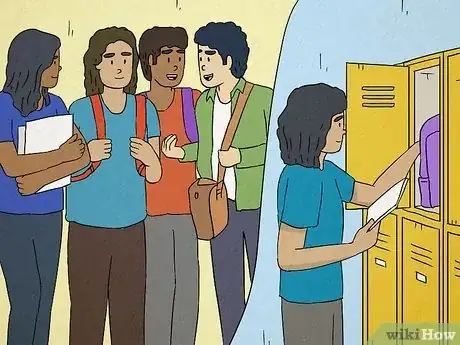
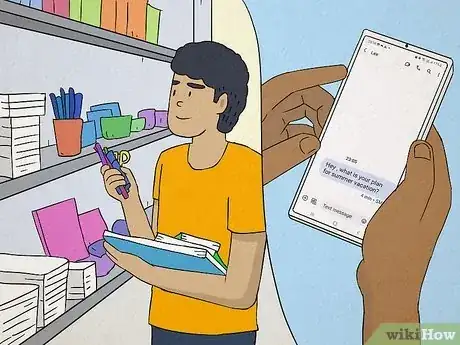
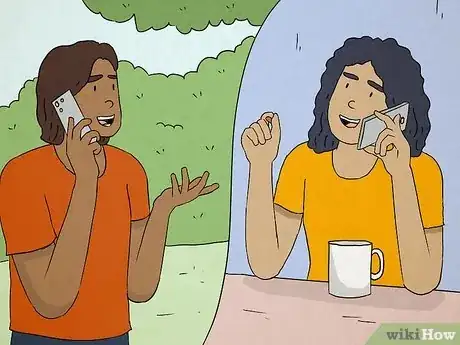




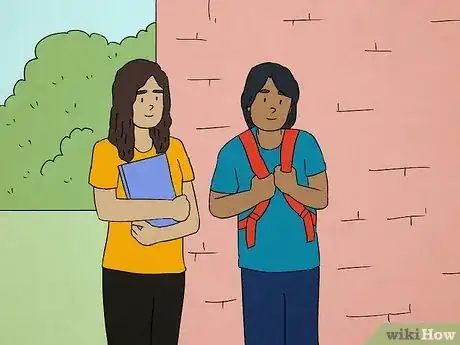

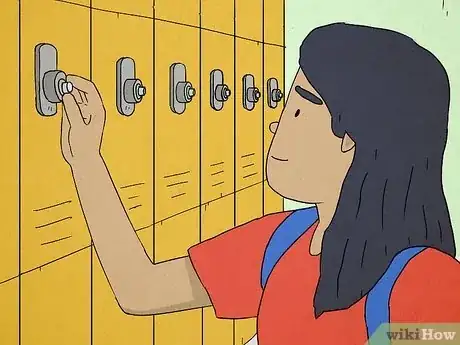





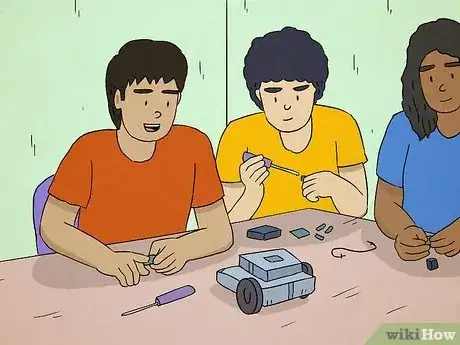



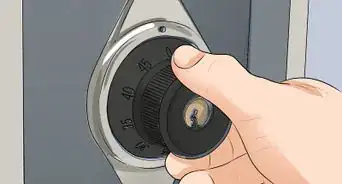
-Step-25.webp)




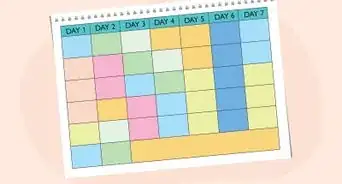





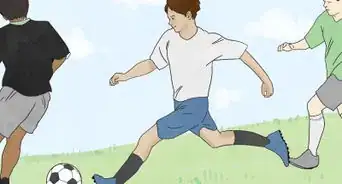
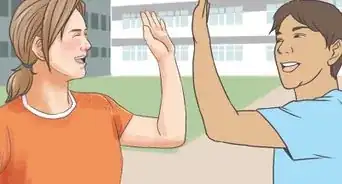






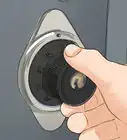
-Step-25.webp)




































